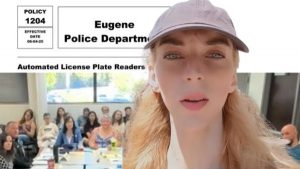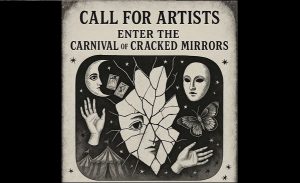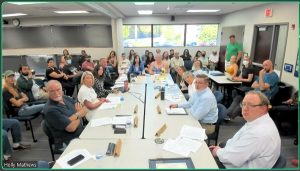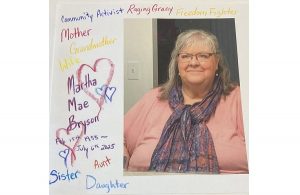City whistleblower: HB 2001 public engagement excluded neighborhoods
8 min read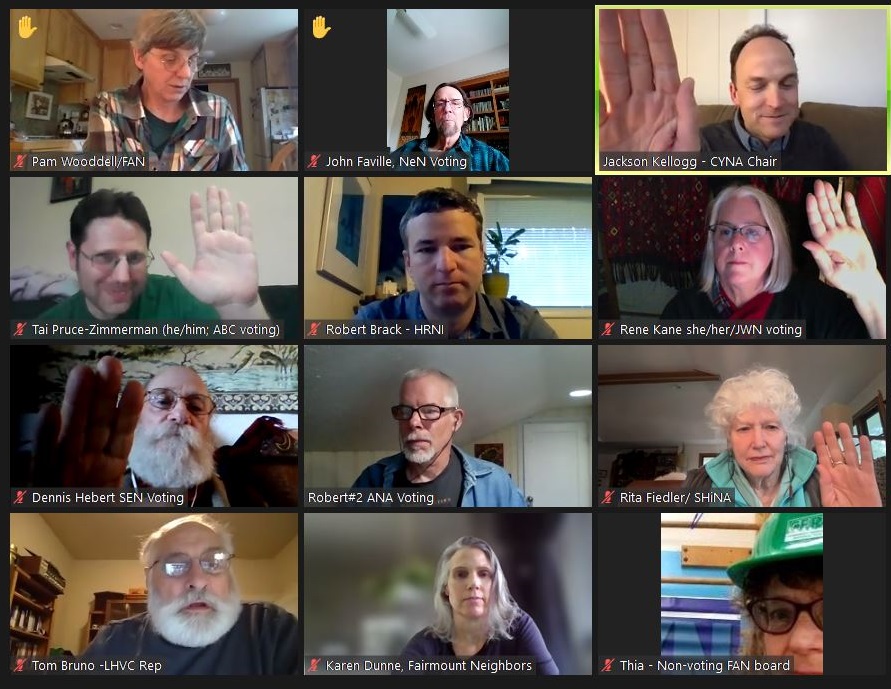
A long-time City insider blows the whistle on Eugene’s Planning Department. Speaking at the HB 2001 public hearing on April 18, Rene Kane.
[00:00:10] Rene Kane: Good evening. My name is Rene Kane and I live in Ward One. I’m one of over 1,100 people who have signed a petition opposing the City Staff’s HB 2001 proposal before you.
[00:00:21] Now retired, I was originally hired as a Land Use Liaison for Eugene’s neighborhood associations and the community. Eugene’s Neighborhood Organization Recognition Policy (NORP) states: ‘The City of Eugene encourages the formation of neighborhood organizations and their involvement in the local government decision-making process.’
[00:00:40] And: ‘Neighborhood organizations will be advisory to the City Council, Planning Commission, and other City boards, commissions, and officials on matters affecting their neighborhoods.’
[00:00:50] My work as a neighborhood planner from 2009-21 was almost exclusively with neighborhood associations. I also sat on the implementation team for HB 2001 code amendments. However, I was never once asked how best to engage neighborhoods in developing this proposal. In fact, the only tool geared toward neighborhood associations and other community groups was developed without my input. There was no training on the tool and no follow-up to see how it was working.
[00:01:19] How effective was it? I was told by Planning staff that one neighborhood organization used it resulting in one neighborhood response. What a failed opportunity.
[00:01:29] In contrast the 2009 City-sponsored neighborhood survey resulted in 4,000 responses. 4,000— largely through the effort of volunteer neighborhood boards. Talk about engaging people literally where they live—in their neighborhoods.
John Q: Rene’s microphone was cut off at that point. By email, she shared her conclusion:
Rene Kane: “So 1,100 is not quite 4,000, but imagine where we would be tonight if neighborhood organizations and the whole community had been engaged in a genuine and meaningful way, if were all able to weigh in on how to address HB2001 as a community. I think tonight’s hearing and your experience and that of the community would be very, very different.”
[00:01:47] John Q: That was Rene Kane at the public hearing. She expanded on those comments at the NLC Meeting April 26.
[00:01:53] Rene Kane: Part of the Neighborhood Organization Recognition Policy (NORP) says we have a role in land use in our neighborhoods. And that’s an agreement that has existed since 1976, so, you know, to me the outreach was absolutely pitiful, absent, and I just wanted you all to know that from my perspective, both as a former staff person—and I hate throwing my former colleagues under the bus—but, you know, South Willamette: Pitiful. HB 2001: Worse. So I think Planning needs a whole bunch of help to be able to reach the community that they’re impacting.
[00:02:35] John Q: Rene said Planning staff did not involve the City’s neighborhoods staff, but developed the public engagement plan behind closed doors.
[00:02:43] Rene Kane: I was the neighborhood person—the one who knew the boards, who knew the schedules, who knew when you had elections, who knew how to reach you and engage you and I was never once asked by Planning Staff to weigh in on the Public Engagement Plan, which is required. I actually had to ask for it twice. I asked for it, then my supervisor at the time had to ask for it so I could read it.
[00:03:11] The only tool that was developed to engage neighborhood associations is called ‘Meeting In a Box.’ And that was developed with no input from me. No questions, ‘Rene, how do we get neighborhoods to use this?’ When you all got it, I got it. And I was BCC’ed on it. So I had no involvement in the one piece of their outreach that was for neighborhood associations to be able to engage their neighbors.
[00:03:39] I asked City staff, ‘So, Meeting In A Box, how did that go?’ At the end of that process, you take a survey: They got one survey response.
[00:03:48] John Q: The one person who responded to the survey turned out to be attending the NLC meeting.
[00:03:53] Jackson Kellogg: Harry Sanger, always great to see you. You’re not a voting member of the NLC, so—
[00:03:58] Harry Sanger: Jon (Belcher) is not here tonight. Would that allow me to be the RRCO (River Road Community Organization) representative?
[00:04:05] Jackson Kellogg: I don’t know. I’m not familiar with the workings of your organization.
[00:04:10] Harry Sanger: Okay. I was the alternate. I’m not sure—
[00:04:13] Jackson Kellogg: Is the group okay with that? Thumbs up? Okay, go ahead. We’re getting, that looks positive. So—
[00:04:18] Rene Kane: Actually, can I, Harry, are you on the RRCO board?
[00:04:21] Harry Sanger: I’m no longer on the board, no.
[00:04:23] Rene Kane: Then I don’t think you can speak on behalf of the neighborhood association.
[00:04:29] Jackson Kellogg: Okay. Well, Harry, maybe you can put your comment in the chat if you’d like to, and people can read it.
[00:04:34] John Q: Harry wrote in the Zoom chat that he may be the person who represented 100 percent of the survey results. That concerned NLC Chair Jackson Kellogg.
[00:04:43] Jackson Kellogg: You know, listening to this, there’s obviously serious problems here. What actions can we take on this as the Neighborhood Leaders Council? How can we move this forward?
[00:04:52] John Q: After hearing Dan Isaacson, the NLC wants to revisit the Citizens Involvement Committee. Here’s Dan speaking at the HB 2001 public hearing April 18.
[00:05:03] Dan Isaacson: …With every new proposal our City has put forward to grow and to be more inclusive, there have been voices of opposition and fear.
[00:05:09] We heard the same arguments against the approval of ADUs, the South Willamette Special Area Plan. And as a result slowed the process…through endless appeals that almost always have lost, but exacerbate our housing crisis.
[00:05:20] Back in 2013, fear and disinformation took center stage at a rally against the expansion of mother-in-law apartments, so aging families could stay together … With every expansion of the opportunities afforded to some granted to the new, we hear the same arguments, the same fear, the same people benefiting from both.
[00:05:37] John Q: At the NLC April 26, Friendly Area Neighbor Pam Wooddell.
[00:05:42] Pam Wooddell: So yeah, the testimony that Dan Isaacson gave as a Planning Commissioner, I felt it was out of place.
[00:05:48] Sadly Eugene has picked the least best way to assure public participation. The citizens’ involvement committee, which is something that the land use laws require is that every city have a CIC, and there were three ways to do that. And Eugene picked the least democratic, the least good way, which was to bury it in the Planning Commission. So it’s up to the Planning Commission to assure that the public has had proper engagement.
[00:06:14] So, it got really prioritized to have people whose voices aren’t usually heard included, and the Healthy Democracy thing I thought was interesting, I supported it. But then we feel like we got left out. For the most part, they didn’t reach out to the neighborhood associations. And Jefferson (Westside) tried to get a panel where that could be the pros and the cons, and they (the City) didn’t want to meet like that, they wanted to be just like, they just do their spiel. They don’t want any opposition.
[00:06:36] I don’t think the public outreach is adequate.
[00:06:38] John Q: Tom Bruno says the City is violating state law.
[00:06:41] Tom Bruno: There are no bios (biographies) in the Planning Commission. And I think it would be nice if you would remind the City Manager, ‘Hey, those bios are supposed to be there and they’re supposed to be there by state law.’ …This is absolutely appalling.
[00:06:56] This is really a breakdown in my opinion of the community. More than 60 percent of the people that attended that and stayed until 12:04 (a.m.), about 60 percent said, ‘Hey, we realize HB 2001 has got to be adhered to, let’s do the minimum standards and let’s not jump into this expansion. But yet there’s 40 percent that says, ‘Oh yeah, let’s expand it and do some more.’
[00:07:23] So when I hear that the Deputy Planning Commissioner attacked me and says I don’t know what I’m talking about, well, I’ll put my bio up against his bio and the math and all that sort of stuff. And I’m really appalled that we had to endure all that time and nothing got accomplished.
[00:07:45] Jackson Kellogg: Yeah, the Planning Commission, the bios apparently are not online. I would encourage people to go Google these people and dig into the Internet and draw your own conclusions about who they are. I did that and it is pretty amazing. So, not to speak badly about a fellow Eugene citizen, but it’s concerning. Go ahead, Dennis.
[00:08:08] Dennis Hebert (Southeast Neighbors): I watched the April 13th work session that they had, and pretty much Terri Harding said about the same thing in a different manner, perhaps, that was said by Dan Isaacson. They don’t want to hear from the same people, they want to hear from different people. So it’s like they want to discount our voices because we are engaged in the political scene, which to me is doing away with the democratic process. They only want to hear from who they want to hear.
[00:08:37] That’s to me very disheartening and especially with Dan Isaacson being on the Planning Commission and Terri Harding, being a staff member, there should be some kind of repercussions as to the words that they said basically about us, because we have opposing views they don’t want to hear from us.
[00:08:56] John Q: With many people turned away from the HB 2001 public hearing, the NLC called for a second session.
[00:09:03] Jackson Kellogg: I move that we request a second public hearing regarding HB 2001 to give those unable to speak at the first hearing—
[00:09:10] Pam Wooddell: ‘An’, not ‘And.’
[00:09:12] Jackson Kellogg: An opportunity. Due to various problems the first meeting proved problematic and numerous people were prevented from speaking.
[00:09:18] All those in favor, please raise your hand.
[00:09:22] Pam Wooddell: 1, 2, 3, 4, 5, 6, 7, 8, 9.
[00:09:26] Jackson Kellogg: Okay, great. All right. And is anyone going to vote against this? Anyone abstaining, any abstentions? I don’t see anyone.
[00:09:33] Okay. So I guess this motion passes.
[00:09:35] So what else for future agenda topics for May. Go ahead, Pam.
[00:09:39] Pam Wooddell: Well, you know, we could look into this Citizen Involvement Committee, you know, just kind of start working on that. I think public involvement is the Goal Number One for Oregon land use law, and you can read the three options that they give for ways to do that—Land Use Goal Number One.
[00:09:53] John Q: A long time City insider blows the whistle: The HB 2001 public engagement plan bypassed the neighborhood staff and the neighborhoods. The NLC starts looking for a structural fix.
Editor’s Note (May 1, 2022 update): Includes the final two sentences of Rene Kane’s prepared comments, which were cut off when the City turned off her microphone. The public hearing on April 18 established time constraints based on the large number of people seeking to participate, and because the City scheduled two public hearings on the same evening.
